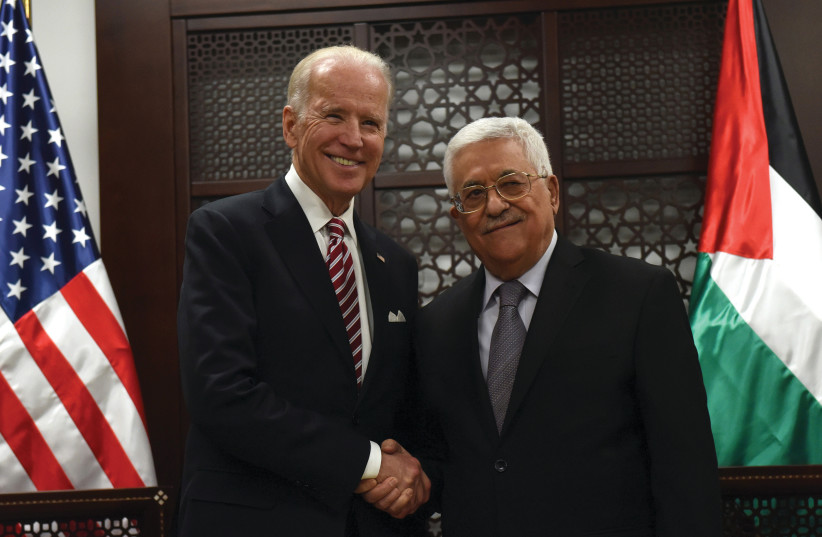Bibi’s Seven Presidents
There was one major setback, though. Netanyahu’s 2015 speech against Obama’s Iran deal before a joint session of Congress irked many Democrats, who felt that Netanyahu was showing up Obama. Netanyahu’s memoir shows that he was aware of the risk of alienating Democratic allies, but he thought: “If I don’t take a stand on a nuclear deal that could threaten Israel’s survival… what the hell am I doing here? That clinched it.”Settling on UN sidelines meeting, US said to tell PM he’ll get Oval Office follow-up
The price was high. Many Democratic allies are still angry with Netanyahu for having given the speech. Even Obama’s vice president recognized how hostile the Obama administration had been as a whole to Israel and to Netanyahu. At one point, Joe Biden said to Bibi, “You don’t have too many friends here, buddy. I’m the one friend you do have. So call me when you need to.” The two men did have something resembling a personal friendship. In 1999, Biden was the sole American politician to write Netanyahu a letter after he lost his premiership for the first time. In 2014, Netanyahu and his wife hosted Biden for dinner when Biden visited Israel to attend Ariel Sharon’s funeral. As Netanyahu wrote of the visit, “Biden, always the gentleman, sent [Bibi’s wife] Sara a bouquet of flowers and a thoughtful note the next day.” Biden also has spoken of giving a photo to Netanyahu with the inscription, “Bibi, I don’t agree with a damn thing you say, but I love you.”
There were no such friendly gestures between the Obamas and the Netanyahus. Obama even kicked Netanyahu on his way out the door, orchestrating an anti-Israel resolution in the UN demanding that Israel “immediately and completely cease all settlement activities in the occupied Palestinian territory” and calling Israeli establishments in Palestinian territory a “flagrant violation” under international law. The measure served little purpose beyond revenge. The administration’s feeble protestations that the U.S. had not been responsible for it fooled no one, least of all Netanyahu, who told the press that “we have no doubt that the Obama administration initiated it, stood behind it, coordinated on the wording and demanded that it be passed.”
Netanyahu was pleased to still be in office when Obama departed. Obama’s successor, Donald Trump, and Netanyahu had had a friendly relationship before Trump’s presidency—Trump recorded a video endorsing Netanyahu in 2013—and Israeli officials were welcome and frequent guests in the Trump White House. The close relations bore fruit: The Trump administration pulled out of Obama’s Iran deal, moved the U.S. Embassy to Jerusalem, recognized Israeli sovereignty over the Golan Heights, and helped bring about the Abraham Accords peace agreements with four Muslim countries. These were all major achievements for Netanyahu. Perhaps more important, Trump’s moves vindicated two long-standing arguments Netanyahu had been making for decades. First, that the West’s fear of the “Arab Street” and the regional instability it would cause was overstated. And second, that there were pathways to peace that did not rely on an agreement with the recalcitrant Palestinians.
After the 2020 election, Netanyahu called Biden to congratulate him on winning the election. It was the right thing to do, as Biden was about to become president and would not have forgiven Bibi if he hadn’t done so. But with Trump leading the polls for the 2024 Republican nomination and a weak Biden vulnerable in the upcoming election, Netanyahu is in a difficult position going into the next cycle. Both the president and his former-president challenger may seek some kind of loyalty test from Netanyahu next year. Trump was so angry when Netanyahu called Biden that he later said, “I haven’t spoken to him since. F— him.”
As for Biden, he has said multiple times that he “loves” Netanyahu, even if they disagree on policy. Biden is more favorably disposed to Israel than Obama, and he also seems to recognize that Netanyahu is a canny political operator and a survivor who has returned again and again upon being counted out.
At the same time, Biden and his administration have been persistently negative toward the new government, with Biden offering typically inarticulate criticism: “I think it’s a mistake to think that, as some members of his cabinet—and this is one of the most extreme members of cabinets that I have seen.” He has been obstinate in not issuing an invitation for Netanyahu to visit Washington, a shortsighted stance Biden later abandoned with the vague promise of a meeting once the administration learned that Netanyahu had planned to go to China to meet with Chinese President Xi Jinping.
As Netanyahu deals with another censorious administration, the history of his previous interactions with six other American presidents can provide insight into how things may proceed. Netanyahu cannot count on getting the kind of policy support that he got from the Trump administration. But he does have his own extensive experience to help guide him through the thickets of current American policy. He has cards to play even now.
First, there is his sense of the larger picture, which he derives from reading what he calls “my guide, history books.” Regardless of short-term disagreements, he believes that the U.S. and Israel are on the same side in a larger struggle of free nations against tyrannies. The second card he has to play is patience. He saw the opportunity for the Abraham Accords but waited until he got the right American partner. As he put it in an interview with the Washington Examiner’s Seth Mandel: “It took me a while to persuade President Trump. Couldn’t persuade President Obama or President Clinton, with whom I worked.” The third card is his willingness to take his case directly to the American public in a variety of media, even when the American president and he disagree. This strategy may be less effective in Democratic administrations as the left becomes more hostile to Israel, but it still can work with the broad swath of the American public, which supports Israel on the whole.
Most important, Netanyahu knows that dealing with a hostile American administration, Democratic or Republican, is a complex game and one he has occasionally played poorly—or has simply been dealt a very bad hand, as was the case with the hostility toward his country shown by both the elder Bush and Obama. That said, his approach across these seven presidents has led to remarkable successes and demonstrates just how nimble and creative a leader he can be.
US officials reportedly told Prime Minister Benjamin Netanyahu’s office that the premier will be invited to meet US President Joe Biden at the White House later this year, after Washington decided to suffice with a meeting between the two leaders on the sidelines of the UN General Assembly next week.Washington, Jerusalem divided on latter’s role in new ‘economic corridor’
A second meeting within months could help blunt the blow for Netanyahu, who has been hoping for a higher-profile Oval Office sit-down with the president when he is in town to address the General Assembly next Friday. Netanyahu waited over seven months before Biden agreed to a meeting, amid Washington’s frustration over the hardline Israeli government’s judicial overhaul and policies toward the Palestinians.
Prime ministers, including Netanyahu in previous terms, visited the White House much earlier on in their tenures.
A senior US official told the Axios news site Tuesday that the White House wants to see how things unfold with the judicial overhaul before extending an invitation for a follow-up meeting between Netanyahu and Biden in the Oval Office.
The High Court of Justice on Tuesday held an unprecedented 13-hour hearing to discuss the constitutionality of the first piece of overhaul legislation passed by Netanyahu’s coalition in July, but is not expected to issue a decision for weeks, if not months.
But with Netanyahu and many in his coalition refusing to state that they’ll abide by the court if the latter chooses to strike down the law, the White House was apparently uncomfortable with the optics of an Oval Office meeting.
The Biden administration announced what it called a “landmark” economic corridor between India, the Middle East and Europe at the G20 summit in New Delhi on Sept. 9.
The corridor will “stimulate economic development through enhanced connectivity and economic integration across two continents, thus unlocking sustainable and inclusive economic growth,” Washington stated. “We aim to usher in a new era of connectivity with a railway, linked through ports connecting Europe, the Middle East and Asia.”
The White House’s 245-word fact sheet does not mention Israel at all, and Jerusalem apparently is not a signatory to the accompanying Memorandum of Understanding (MoU) between the Saudi, European Union, India, Emirati, French, German, Italian and American governments.
The 325-word memorandum mentions Israel once, acknowledging that the two corridors will enable “goods and services to transit to, from, and between India, the UAE, Saudi Arabia, Jordan, Israel and Europe.”
During the U.S. State Department press briefing on Sept. 11, Matthew Miller, the department spokesman, was asked if the agreement was part of normalization efforts between Riyadh and Jerusalem. “No, it is separate from,” he said. “It is separate.”
On Saturday, Israeli Prime Minister Benjamin Netanyahu had a very different story to tell about what he said was a “unique and unprecedented era of global and regional cooperation.”
“The State of Israel will be a central junction in this economic corridor. Our railways and ports will open a new gateway from India through the Middle East to Europe and back—from Europe to India via Jordan, Saudi Arabia and the United Arab Emirates,” he stated.
“This link will also realize a multi-year vision that will change the face of the Middle East and Israel, and will affect the entire world,” added the prime minister. “Its vision reshapes the face of our region and allows a dream to become reality.”













































